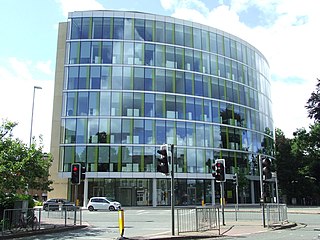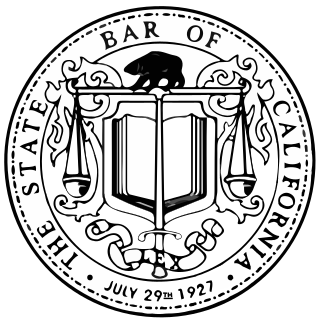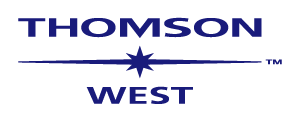
A lawyer is a person who practices law. The role of a lawyer varies greatly, across different legal jurisdictions. A lawyer can be classified as an advocate, attorney, barrister, canon lawyer, civil law notary, counsel, solicitor, legal executive, and public servant. — with each role having different functions and privileges. Working as a lawyer generally involves the practical application of abstract legal theories and knowledge to solve specific problems. Some lawyers also work primarily in advancing the interests of the law and legal profession.

A notary public of the common law is a public officer constituted by law to serve the public in non-contentious matters usually concerned with general financial transactions, estates, deeds, powers-of-attorney, and foreign and international business. A notary's main functions are to validate the signature of a person ; administer oaths and affirmations; take affidavits and statutory declarations, including from witnesses; authenticate the execution of certain classes of documents; take acknowledgments ; provide notice of foreign drafts; provide exemplifications and notarial copies; and, to perform certain other official acts depending on the jurisdiction. Such transactions are known as notarial acts, or more commonly, notarizations. The term notary public only refers to common-law notaries and should not be confused with civil-law notaries.
In its most general sense, the practice of law involves giving legal advice to clients, drafting legal documents for clients, and representing clients in legal negotiations and court proceedings such as lawsuits, and is applied to the professional services of a lawyer or attorney at law, barrister, solicitor, or civil law notary. However, there is a substantial amount of overlap between the practice of law and various other professions where clients are represented by agents. These professions include real estate, banking, accounting, and insurance. Moreover, a growing number of legal document assistants (LDAs) are offering services which have traditionally been offered only by lawyers and their employee paralegals. Many documents may now be created by computer-assisted drafting libraries, where the clients are asked a series of questions that are posed by the software in order to construct the legal documents. In addition, regulatory consulting firms also provide advisory services on regulatory compliance that were traditionally provided exclusively by law firms.
An attorney at law in the United States is a practitioner in a court of law who is legally qualified to prosecute and defend actions in court on the retainer of clients. As of January 1, 2023, there were 1,331,290 active lawyers in the United States. In terms of absolute numbers, the American legal profession was the largest in the world as of 2015, and it is thought to be the largest in the world in proportion to domestic population. A 2012 survey conducted by LexisNexis Martindale-Hubbell determined 58 million consumers in the U.S. sought an attorney in the last year and that 76 percent of consumers used the Internet to search for an attorney.

A paralegal, also known as a legal assistant, or paralegal specialist is a legal professional who performs tasks that require knowledge of legal concepts but not the full expertise of a lawyer with an admission to practice law. The market for paralegals is broad, including consultancies, companies that have legal departments or that perform legislative and regulatory compliance activities in areas such as environment, labor, intellectual property, zoning, and tax. Legal offices and public bodies also have many paralegals in support activities using other titles outside of the standard titles used in the profession. There is a diverse array of work experiences attainable within the paralegal field, ranging between internship, entry-level, associate, junior, mid-senior, and senior level positions.
A conflict of interest (COI) is a situation in which a person or organization is involved in multiple interests, financial or otherwise, and serving one interest could involve working against another. Typically, this relates to situations in which the personal interest of an individual or organization might adversely affect a duty owed to make decisions for the benefit of a third party.
FreeWill Co is a company whose website, FreeWill.com, has online software which helps people write wills for free and make charitable contributions, and it reports each person's planned bequests to charities which pay subscription fees. It also helps people write advance healthcare directives and living trusts in California.

A law firm is a business entity formed by one or more lawyers to engage in the practice of law. The primary service rendered by a law firm is to advise clients about their legal rights and responsibilities, and to represent clients in civil or criminal cases, business transactions, and other matters in which legal advice and other assistance are sought.

The State Bar of California is an administrative division of the Supreme Court of California which licenses attorneys and regulates the practice of law in California. It is responsible for managing the admission of lawyers to the practice of law, investigating complaints of professional misconduct, prescribing appropriate discipline, accepting attorney-member fees, and financially distributing sums paid through attorney trust accounts to fund nonprofit legal entities. It is directly responsible to the Supreme Court of California; however, its trustees are now appointed by the Supreme Court, the California Legislature, and Governor of California. All attorney admissions are issued as recommendations of the State Bar, which are then routinely ratified by the Supreme Court. Attorney discipline is handled by the State Bar Office of Chief Trial Counsel, which acts as prosecutor before the State Bar Court of California. The State Bar has been cited for its corrupt practices during the 21st century, and is subject to reforms issued by its governing body, the California Supreme Court.
FindLaw is a business of Thomson Reuters that provides online legal information in the form of state laws, case law and codes, legal blogs and articles, a lawyer directory, DIY legal services and products, and other legal resources. The company also provides online marketing services for law firms. FindLaw was created by Stacy Stern, Martin Roscheisen, and Tim Stanley in 1995, and was acquired by Thomson West in 2001.

West is a business owned by Thomson Reuters that publishes legal, business, and regulatory information in print, and on electronic services such as Westlaw. Since the late 19th century, West has been one of the most prominent publishers of legal materials in the United States. Its headquarters is in Eagan, Minnesota; it also had an office in Rochester, New York, until it closed in 2019, and it had an office in Cleveland, Ohio, until it closed in 2010. Organizationally, West is part of the global legal division of Thomson Reuters.
LegalZoom.com, Inc. is an American online legal technology and services company launched in 2001. It helps its customers create legal documents without necessarily having to hire a lawyer. Available documents include wills and living trusts, business formation documents, copyright registrations, and trademark applications. The company also offers attorney referrals and registered agent services.
Law practice management (LPM) is the management of a law practice. In the United States, law firms may be composed of a single attorney, of several attorneys, or of many attorneys, plus support staff such as paralegals/legal assistants, secretaries, and other personnel.

Avvo.com is an online marketplace for legal services, that provides lawyer referrals and access to a database of legal information consisting primarily of previously answered questions. Lawyer profiles may include client reviews, disciplinary actions, peer endorsements, and lawyer-submitted legal guides.
Goldfarb v. Virginia State Bar, 421 U.S. 773 (1975), was a U.S. Supreme Court decision. It stated that lawyers engage in "trade or commerce" and hence ended the legal profession's exemption from antitrust laws.
Rocket Lawyer is an online legal technology company founded by Charley Moore in 2008, based in San Francisco, California. It provides individuals and small to medium-sized businesses with online legal services—including incorporation, estate plans, and legal document review. The company also provides a network of attorneys that consumers and small businesses can consult with on legal issues through its On Call service. In 2012, Rocket Lawyer UK was launched.
Unbundled legal services, also known as limited scope representation and discrete task representation, is a method of legal representation in which an attorney and client agree to limit the scope of the attorney’s involvement in a lawsuit or other legal action, leaving responsibility for those other aspects of the case to the client in order to save the client money and give them more control. Unbundled legal services, limited scope retainers or discrete task representation are available in multiple jurisdictions, including the United States, as well as the Canadian provinces of British Columbia and Ontario. One common use of unbundled legal services is family law, as a case is often too complex for a pro se litigant to handle alone but the cost of full-service legal representation is often prohibitive.
Brad Lowber Hendricks is an American attorney, former President of the Arkansas Trial Lawyers Association, and President of The Brad Hendricks Law Firm, one of the largest firms in the State of Arkansas. He is the son of Lowber Hendricks, a prominent Arkansas attorney and Pulaski County Circuit Court Judge. Brad's decision to become an attorney is largely attributed to his father, Lowber Hendricks. His siblings are Karol Anne McNutt and Bryan Hendricks.

Public law libraries provide access to primary legal sources and secondary sources used in legal matters. In most U.S. states, public law libraries are part of the trial court system, a department of the state or county government, or an independent local government agency managed by a board of trustees. Public law libraries serve several user groups with different information needs: judges and their support staff, attorneys in all types of practice, and the general public.

Nintendo of America, Inc. v. Blockbuster Entertainment Corp. is a 1989 legal case related to the copyright of video games, where Blockbuster agreed to stop photocopying game instruction manuals owned by Nintendo. Blockbuster publicly accused Nintendo of starting the lawsuit after being excluded from the Computer Software Rental Amendments Act, which prohibited the rental of computer software but allowed the rental of Nintendo's game cartridges. Nintendo responded that they were enforcing their copyright as an essential foundation of the video game industry.









